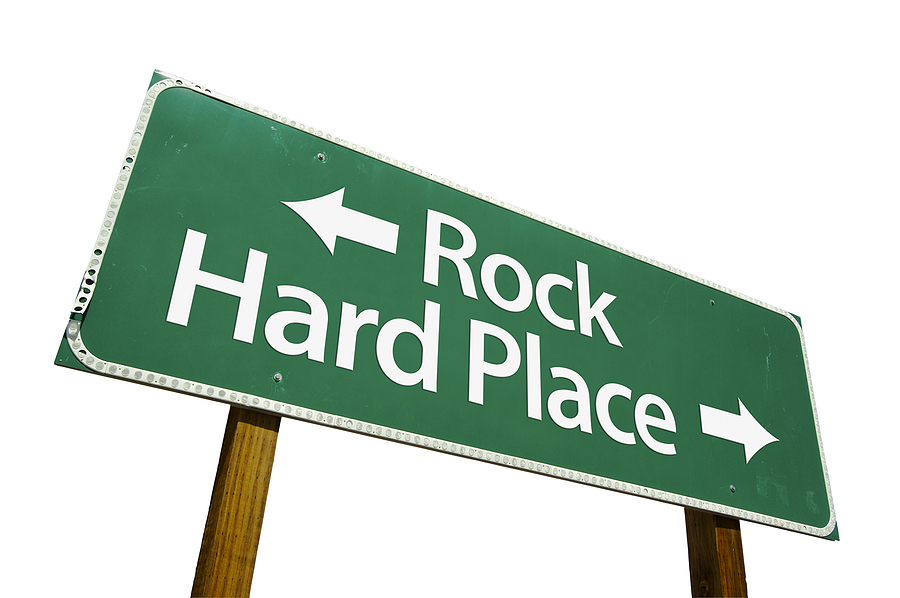Many writers find themselves caught between fulfilling their creative writing desires and activities that pay living expenses. More often than not, they are different things.
Throughout history, highly successful authors had other vocations while they developed their skills for writing books. If you go online and search for “day jobs of famous writers,” you’ll discover the only thing they have in common is the need to make a living.
Doctors, lawyers. salespersons, exterminators, butchers, bakers, and candlestick makers.
Maybe there are a few cases of promising writers underwritten by a benefactor, so they can concentrate on their craft; but most humans need to relegate writing to the spaces between real-life responsibilities.
If real life is the metaphorical rock, on the other side is the hard place, which is the creative restrictions placed on professional writers.
The challenge for any aspiring author is to write something original, but at the same time similar to books already available. New and fresh, but recognizable by the publisher as the sort of thing they successfully publish or by the reader as the kind of book they enjoy.
We can see how this plays out with comparable titles. One reason agents and publishers ask for comparable titles in a book proposal is to test you. If there is “nothing like this currently available,” it means there is no track record for your book type, which is not good. Similarly, if you determine the only comparable titles are iconic bestsellers, you won’t be taken seriously.
Real comps live between extreme examples.
The challenge for authors is to find things to write that are not so far “out of the box” they become too risky to publish.
Just don’t assert your book is unlike anything ever published. These words are translated by those in the book industry as “don’t publish this.”
An even worse-case scenario for an author is their desired book is in a category that has proven not to sell well.
So what’s left for an author who is caught between this rock and a hard place?
Focus your effort on developing your own writing style.
Consider professional musicians. They are technically proficient and, when in a group, contribute to the overall performance by hitting the right notes at the right time in the right way. They follow the conductor’s instructions.
Now consider solo musicians. They have a style all their own, a recognizable brand, standing out from the choir or orchestra. They still hit the right notes in the right way, but their style sets them apart. Often, the group follows them.
Authors are more like soloists.
If you find yourself between two hard places, focus on nurturing your own creative style. It is far beyond proper spelling, grammar, sentence structure, or story formula. You won’t discover it in a style guide, but in your heart and head.




You’re writing in the space between,
a narrow pass, a crucible,
and if you’re careful this can mean
the birth of something beautiful.
You have to parse your precious time
and your very thoughts
to make your paper-children chime
with readers’ hearts, edge of the box.
It’s something like solo ascent
of a virgin face of rock
where no fingers, no feet went,
where no-one’s place a chock.
You may slip, and you may fall,
or rise to see beyond the wall.
As someone who has been plugging away at this writing thing for 20 years, I have found myself in that place many times. Mothers always write between vital everyday tasks, but that doesn’t mean we don’t get writing done. These years of craft-building have been vital learning times. While I do find my writing lands more on the “weirdly unique” side of things, all of this practice is helping me to learn how to tap into the core longings of readers to give them the experience they are looking for while staying unique.
Thanks for the highly appropriate metaphor, Dan! I don’t have enough wiggle room between the rock of earning enough at regular jobs and the hard place of building a platform. I have 12 books waiting for representation and publication, two with excellent reviews from excellent agents; but the vast amount of time, knowledge, and resources required to build a platform just isn’t there. I’m trying to move the rock a little by cutting my office hours and polish the hard place by taking Thomas Umstattd’s course, since apparently the hard place is immovable ;-), but it’s a slow process and waiting to see any progress is challenging! Can working on one’s hard place “nurture your style”?
This isn’t a platitude or a bumper-sticker phrase, but absolute truth: The journey will change you.
So yes, working between the hard places will nurture your style.
I find it difficult to read other books in my genre. I don’t want to be labeled for plagerism. I believe my books are reader-friendly, enjoyed, and readers want more in my series.
So, self-publishing allows me that freedom.
I reread my books and am continuing to find best readers, not a best seller.